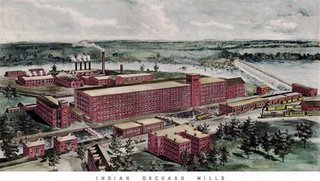Indian Orchard Mills
 This is the home of Dan Wyman Books, source of all the Judaica I catalog. Inside this building, up on the fourth floor, in the back, is where all the books live when they're not visiting the Emory House. I've got perhaps a thousand scattered all over my house; Dan's got tens of thousands shelved in here.
This is the home of Dan Wyman Books, source of all the Judaica I catalog. Inside this building, up on the fourth floor, in the back, is where all the books live when they're not visiting the Emory House. I've got perhaps a thousand scattered all over my house; Dan's got tens of thousands shelved in here.The Mills a century ago was the largest employer in Indian Orchard. A canal diverted water from the Chicopee River through penstocks and past turbines to power the machinery in the mills. With the railroad passing in front of the complex, the river behind, and Main Street only a block away, the Indian Orchard Mills was a hub of activity.
The Indian Orchard Manufacturing Company, owner of the mills, was responsible for much of the infrastructure at the time, donating land for schools, libraries and parks. These mills, other mills located on the same river but closer to Ludlow, and the Chapman Valve Company were the main employers of Indian Orchard in the nineteenth century. They attracted many immigrants to the town in the 1890's and in the early 1900's. Irish, Poles, and French Canadians made up the bulk of this immigrant population.
The Mills eventually languished as manufacturing in the Northeast declined. Today, however, the Mills is once again a pretty vibrant place. Up on the fourth floor with Dan are a piano restorer, a jeweler, and a pocketbook maker, among others. Below us are furniture builders, screen printers, die cutters...name your trade; we probably have it. Next door is a moving company; behind us are artists' lofts. Spring and fall the artists hold an opening, with wine, cheese, a little music combo--very laid-back and cool.
Dan has trouble finding helpers willing to work in the warehouse, bookkeepers particularly. One recent new hire who was visualizing, I guess, a chatty office complete with water cooler, lasted two days. She said the place creeped her out. I like it, though. I make a pot of coffee and listen to blues from one tenant's radio mingled with Brenton Evans testing his pianos with Chopin and Dvorak. Above me, someone is hammering; below me, someone else is drilling. It's the sound of people being useful and productive. What's not to like?
Labels: architecture, art, books, cataloging, Indian Orchard, Springfield

